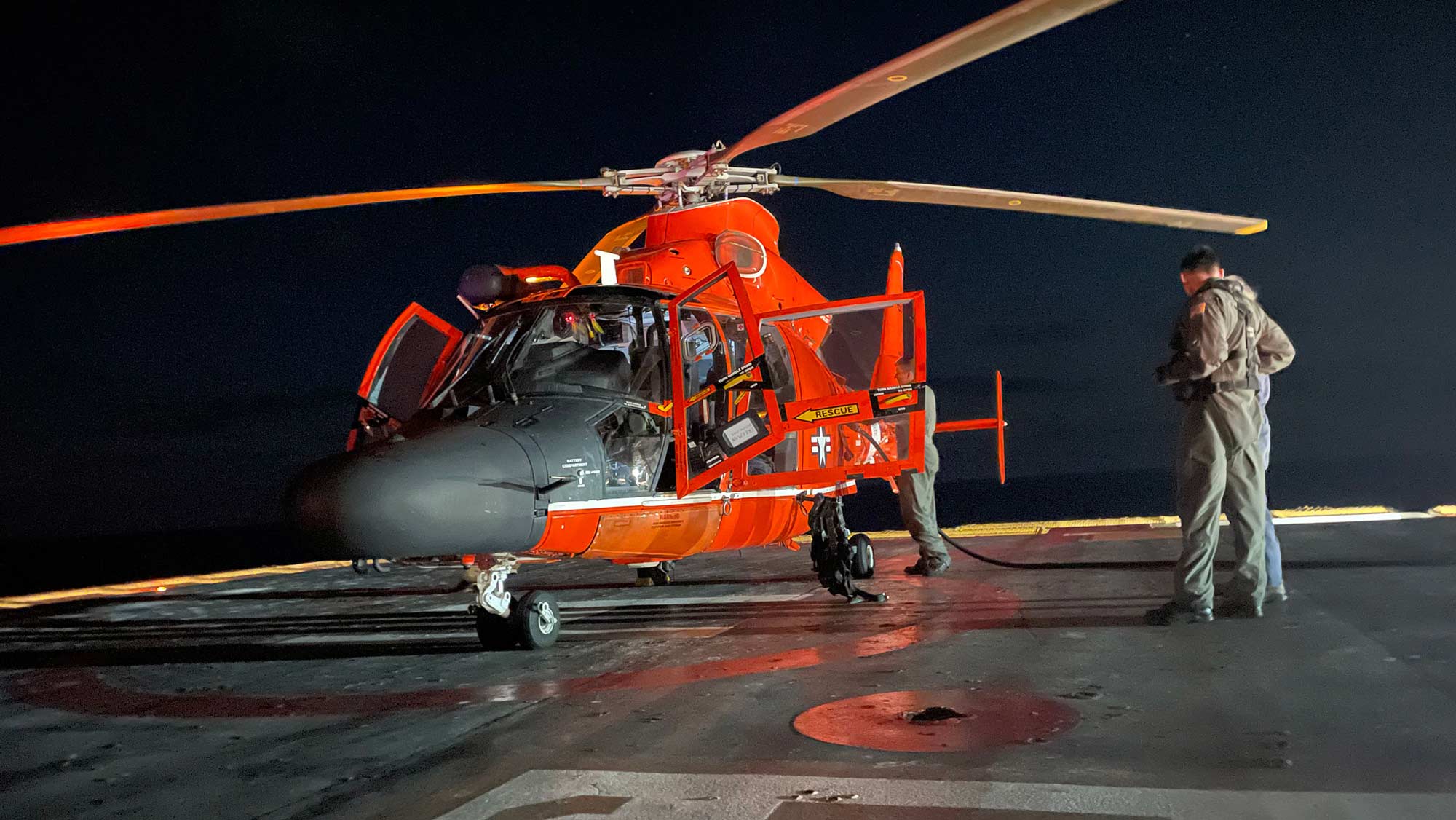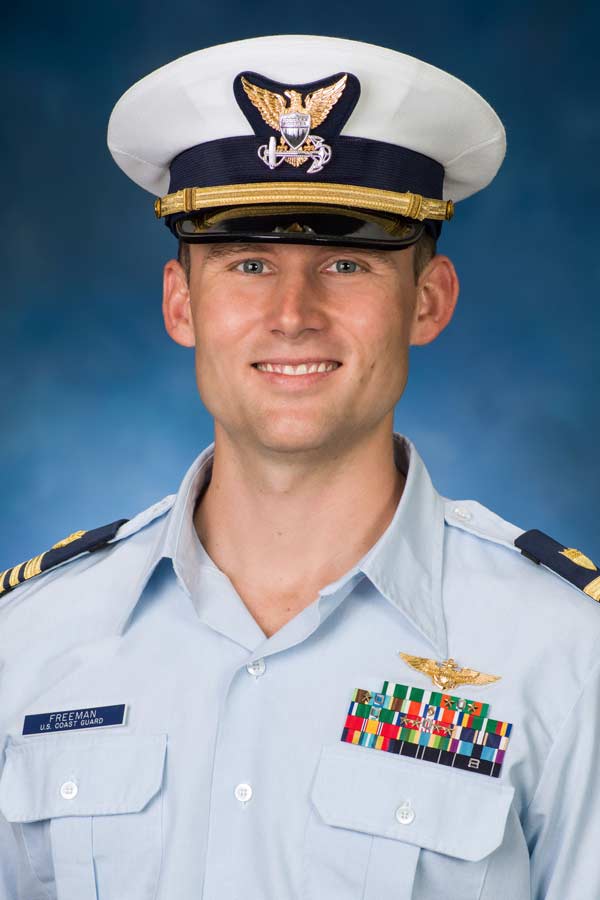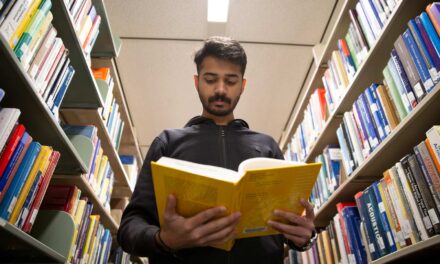
Setting the course in electrical engineering
Coast Guard officer Mike Freeman advocated for online delivery of the accelerated electrical engineering master’s degree program

When he received his first bachelor’s degree in management from the U.S. Coast Guard Academy, Mike Freeman had every intention to become a businessman after his five years of Coast Guard service were completed. But all of that changed when Freeman reported to his first assignment.
“Working with aviators landing their helicopters on the tiny flight deck of the Coast Guard’s USCGC Confidence ship convinced me that aviation was the path for me,” he says. “Once accepted into flight school, I became a fanatic and learned as much about aviation and aerospace as possible.”
With his newfound passion, Freeman didn’t wait to leave service to pursue his next goal and started his journey to earn a bachelor’s degree in electrical engineering from the School of Electrical, Computer and Energy Engineering, part of the Ira A. Fulton Schools of Engineering at Arizona State University. The field has many applications in aviation and aerospace technology, such as designing sensors and aircraft instrumentation. Because his military assignments had him moving around the country, Freeman chose the program’s online delivery method, which shares the same course path and the ABET accreditation as the in-person offering.

Coast Guard MH-65E Dolphin Helicopter Instructor Pilot and Flight Examiner Mike Freeman. Photo courtesy of Mike Freeman
Freeman also knew he wanted to earn an advanced degree and became interested in pursuing the accelerated master’s degree program, enabling him to complete both his bachelor’s and master’s degrees in five years.
“I first heard of the accelerated degree program when I was applying for school in 2017 and knew that it would be a great option for me with my full-time career and family commitments,” he says.
In ASU’s accelerated master’s degree programs, students can use master’s degree courses to fulfill elective credits at the bachelor’s level, reducing the length of time it takes to fulfill the requirements for both degree programs.
However, the accelerated electrical engineering master’s degree program was only offered on campus when Freeman started at ASU. Yet, he was determined to complete it as an online student.
Freeman was persistent throughout his studies in advocating for an online delivery method of the accelerated program to benefit nontraditional students. He worked with the electrical engineering advising team to get an online delivery method of the accelerated program set up and became the first student to enroll once it was approved.
This summer, Freeman became the second student to graduate from the accelerated program’s online delivery method. (The first graduate, Trang Dunham, graduated in spring 2022.)
“Our success in online deployment of our undergraduate, master’s and accelerated degrees has greatly expanded our reach to students who would otherwise not have access to our programs,” says Stephen Phillips, director of the School of Electrical, Computer and Energy Engineering. “Graduates like Mike Freeman demonstrate what our highly motivated students can accomplish.”
The accelerated program’s online delivery method follows the same curriculum as its in-person counterpart, including the same rigorous expectations for students to gain hands-on engineering experience. Freeman’s favorite part of the program was the undergraduate senior capstone project.
“My capstone team had a fantastic mentor, David Ramirez, who at the time worked at General Dynamics Mission Systems. He helped us get a home-built radar set off the ground and running,” Freeman says. “It was really enjoyable figuring that challenge out.”
As an online student, Freeman says communication was key. He informed his instructors early on that his schedule as an active duty servicemember could be unpredictable at times, and with tasks like hurricane response deployments, he might need flexible deadlines to complete his assignments.
“It’s gotten much easier to connect with professors and other students during my time at ASU, and that will hopefully continue to improve,” Freeman says.
He credits a large part of his success in the program to School of Electrical, Computer and Energy Engineering academic advising staff members Robert Monahan and Lynn Pratte.
Monahan sought authorization of the online delivery method for the accelerated electrical engineering master’s program and Pratte served as Freeman’s academic advisor for the graduate portion of the program. Freeman praises Pratte as being highly invested in her students’ success.
“Working with Mike has been awesome,” Pratte says. “He advocated for himself and other students who are interested in this program. Actions like his are what make ASU #1 in innovation.”
Freeman took two courses in electronic materials and quantum mechanics with Michael Goryll, an associate professor of electrical engineering who remembers Freeman as a standout student.
Goryll helped Freeman prepare for his comprehensive exam, a requirement to receive his master’s degree, and was so impressed with Freeman’s achievements that he nominated him to the Institute of Electrical and Electronics Engineers Eta Kappa Nu honor society.
“My experience working with Mike has been great,” Goryll says. “While the quantum mechanics course is very mathematical, Mike was very enthusiastic about it and never lost his motivation.”
Now a lieutenant commander, Freeman works as a helicopter flight examiner and instructor pilot at the Coast Guard’s Air Station Houston in Texas.
He hopes to use his new degree to seek further technical leadership roles in the Coast Guard. After his military service is up, Freeman will pursue work in technical roles in the aerospace industry.
“I’m a total space nerd and look forward to advancing humanity’s presence in space,” he says.



































